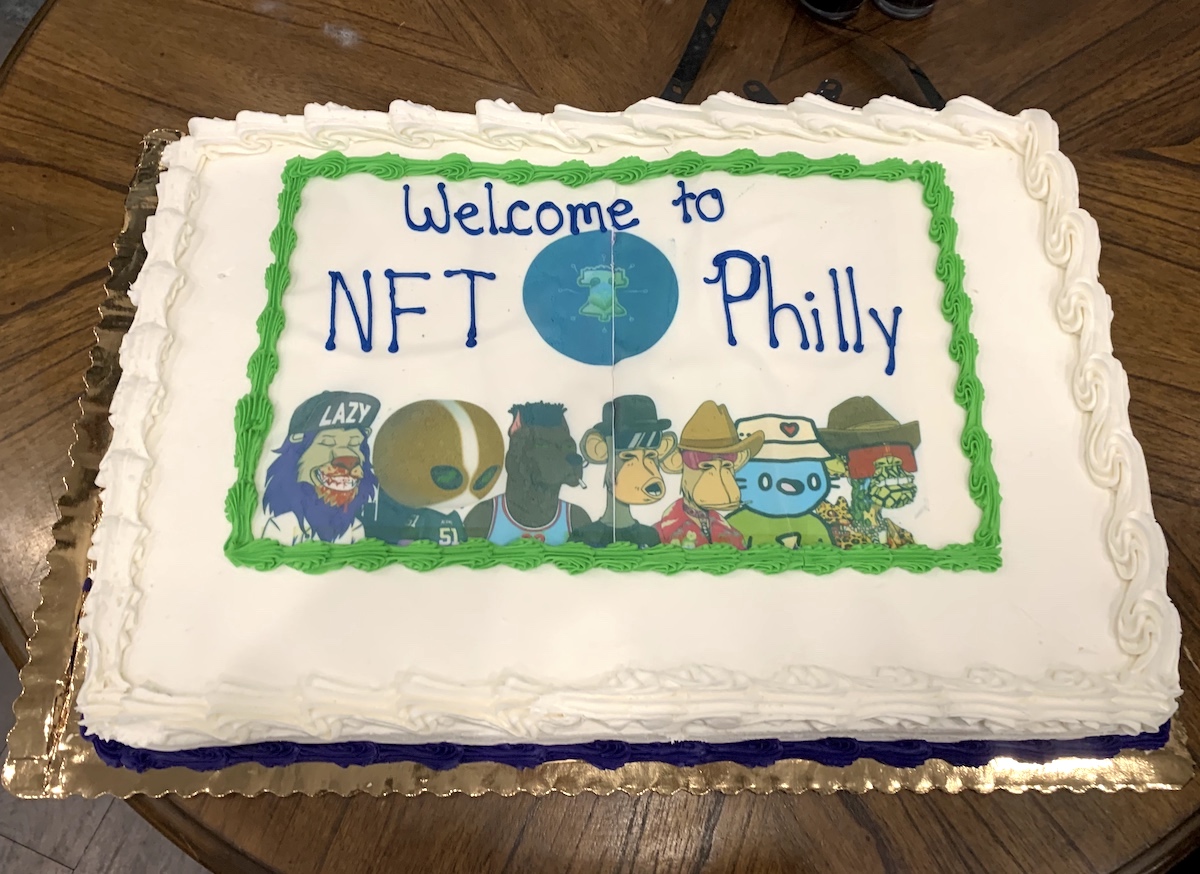Software Development
Aug. 17, 2022 11:37 am
Advertisement
A cake decorated with local collectors’ NFTs at NFT Philly’s inaugural meetup.
(Photo by Valerie Dowret)
If you’ve heard folks say they’re “getting into Web3,” they could be talking cryptocurrencies, blockchain technologies, virtual reality, nonfungible tokens or a host of other topics that make up this connected — yet decentralized — future-of-the-internet concept.
In the last few years, the Philly region has gained a score of organizations and advocates for these technologies as they permeate other industries. You might have seen esports companies like Nerd Street Gamers or even convenience store chain Wawa dabble in NFTs. The City of Philadelphia even briefly considered getting in on a cryptocurrency called CityCoin.
On Aug. 10, Technical.ly gathered Web3 enthusiasts on our public Slack for a live AMA (“ask me anything” in Reddit terms) about what drew them to the space, why they’re involved, what to do in an unstable crypto market and where they think the future of the tech is going. A few of them represented some of the local groups that have formed over the last few years, including NFT Philly and DeFi Philly.
Off the bat, we heard that these folks are excited by Web3’s promise of freedom, transparency and the idea of “fully owning something.”
Jake Voorhees, a co-organizer of the DeFi Philly, which hosted its inaugural conference in July 2022, said the group purposely targeted the week of Independence Day for its first conference to highlight the ideals they feel are embraced within the decentralized finance community.
Advertisement
“What Web3 means to me is the next era of technology that focuses on one issue that was lost long ago,” Voorhees said last week during the AMA. “John Locke’s original trinity, ‘Life, Liberty, and Property’ is finally brought to life in Web3 where regular people can avoid property restrictions of their assets, and be free from objections and challenges caused by banks, institutions, boards, or governments.”
A panel about building digital communities at DeFi Philly’s 2022 conference. (Photo by Paige Gross)
Others, like NFT Philly co-organizer Bar Franek, were drawn in by the people involved. He first got involved in the NFT community via the Bored Ape Yacht Club — the now-elite NFT collection built on the Ethereum blockchain — and said he met some of his fellow “apes” for the first time at an NFT NYC meetup last year. Now, he’s helping build the scene in Philly through his own meetup.
“I was amazed by the diversity of people and what they do and how they got into the space,” Franek said of that 2021 meetup. People that are into Web3 and NFTs seem to have a brighter outlook on life and the future, and they’re very excited to meet others doing the same thing. We’re all here to help each other.”
A few of the participants mentioned that Web3 technologies offer users the ability to monetize their work. Artists, musicians and even athletes have been making money through NFTs or other digital assets, and it gives them a more direct connection to fans, some say.
NFT Philly cofounder Tyrone Robertson, who came into the space from collecting physical art, said NFTs have made it fun for people to use a JPEG as their identity in this digital space, and noted that some even dress up as their profile pictures in real life. They might also do so to keep their real identities hidden.
The anonymity of Web3 is something that draws some into the space, while confusing others. Case in point: Another NFT Philly co-organizer uses an avatar and the pseudonym Squiddy as his online persona. Squiddy is a nickname carried over from high school days, he said, and while it used to annoy him, he now embraces it — “hiding in plain sight is so fun.”
Others stick to avatars and usernames for more practical reasons.
“There are some people that are hardcore about anonymity. It makes sense when you’re dealing with assets worth a lot of money,” Franek said. “You don’t want to be a target.”
Bar, who wears a black Mutant Apes Yacht Club sweatshirt, at the Falling Down the NFT Rabbit Hole event in April 2022. (Photo by Valerie Dowret)
It’s true that we’ve seen a lot of money changing (digital) hands when it comes to assets like NFTs and different cryptocurrencies. The NFT market alone passed $40 billion in 2021, and last fall, the value of all cryptocurrencies was said to reach $3 trillion. Some well-known institutions are further normalizing its use by accepting forms of cryptocurrency as payment, including The Wharton School, which now takes Bitcoin, Ethereum and USD Coin along with regular US dollars for its blockchain economics certificate program.
But the market can be volatile, and this year has seen a “crypto winter” — one that may be worse than others before it. From CNBC: “Cryptocurrencies have suffered a brutal comedown this year, losing $2 trillion in value since the height of a massive rally in 2021.”
Has that turned folks off? In this group, hardly.
Voorhees said it’s how emerging markets go, leading to a cycle of building, innovation and progress. Erik Caputo, of BeMetaVersed consulting firm, said he thinks the crash was the best thing that could have happened for the market: It’s weeded out people who aren’t very serious.
“This past year built a lot of hype and pulled in even more consumers that were looking to ‘get rich quick’ by flipping NFTs, etc.” he said. While others left with the market downturn, “those who were serious about this tech and using it to build/innovate industries and not fully as a financial avenue” are now sticking around.
Franek said he understands that some people are critical about crypto, NFTs and the wider Web3 space. Voorhees said he usually starts by asking folks what their relationship with money is like, and Robertson said he usually asks if there’s something that inspires them, like sports or music or art, that could have a digital assets tie. He also touts that the community here aims to be inclusive.
But others, like Squiddy, aren’t that interested in engaging.
“I’m not interested to talking to people who are skeptical of these technologies. I see the good and what it can do, and worried about making my own impact,” he said. “I love onboarding people who are interested. Won’t waste my time arguing with people.”
Ultimately, those who are interested in Web3 are grateful to have front-row seats to how the technology will evolve in the years to come. Caputo said he still has a lot to learn, but he adds some knowledge every day, and he feels respected for the time and effort he puts in. Being a younger professional isn’t a deterrent here, he said, and anyone can get involved.
“Because the tech was so new, really nobody was necessarily an ‘expert,’” Caputo said. “I also view these possibilities of growth as endless, there are a number of different industries that will be innovated from this, and being able to watch as the world evolves around you and this tech is enlightening. I can only imagine this was the experience in the 2000s as the internet was developing and now I am here to witness it first hand.”
Read the whole conversation in the #ama channel of Technical.ly’s Slack:
Advertisement


